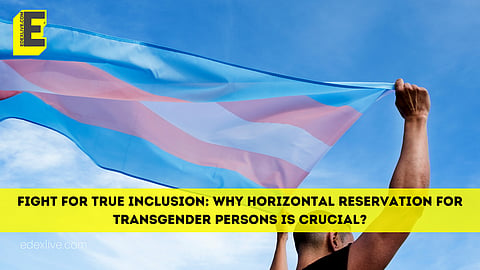

The transgender community in India is gearing up to file a fresh petition in the Supreme Court, seeking horizontal reservation in education and public employment. The transgender community in India, despite constitutional guarantees and landmark judgments like NALSA (2014), continues to face systemic discrimination.
Their marginalisation is compounded when intersected with caste, economic disparity, and societal stigma. The ongoing debate around horizontal reservation highlights the pressing need to address this inequity holistically.
Double discrimination and intersectionality
Jane Kaushik, activist for trans rights and the main petitioner of the Supreme Court case Jane Kaushik Vs Union of India, 2024 a case in which Jane, a transgender woman challenged her dismissal from schools in Uttar Pradesh and Gujarat after her gender identity was disclosed, highlighted the unique challenges faced by transgender individuals in India, especially those from marginalised castes.
"As a transgender woman from the OBC (Other Backward Class) category, I face discrimination not only for my gender identity but also for my caste. This is even more pronounced for transgender individuals from SC and ST (Scheduled Caste and Scheduled Tribe) backgrounds," she said.
Kaushik recounted her experiences in Rajasthan, where caste plays a dominant role in shaping societal interactions. "In rural areas, people openly ask about your caste before anything else. Imagine the compounded oppression faced by Dalit transgender women," she added.
Kaushik emphasised the need for horizontal reservation, explaining that the current system in states like Rajasthan and Madhya Pradesh places transgender individuals under the OBC category.
"This approach fails to account for the intersectionality of caste and gender. As an OBC transgender woman, I gain no additional benefits from this reservation policy. Similarly, SC and ST transgender individuals are deprived of meaningful representation," she argued.
The case for horizontal reservation
Horizontal reservation, as opposed to vertical reservation, addresses multiple identities simultaneously, such as gender and caste.
Activists argue that this system is essential for ensuring equitable opportunities for transgender individuals. Karnataka’s pioneering move to introduce 1% horizontal reservation for transgender individuals in public employment has been lauded as a significant step forward.
"Initiatives like Karnataka’s have given transgender individuals a chance to enter mainstream professions, such as teaching," Kaushik noted, citing the example of KN Renuka, a guest lecturer at Karnataka University.
Challenges in implementation
However, the road to effective implementation remains fraught with challenges. Uma P, a transgender rights activist from the organisation Jeeva, Bengaluru, observed that many government departments in Karnataka have been slow to adopt the 1% reservation policy. "While the judgment is a positive step, lack of support and follow-through from various departments has limited its impact," she said.
She outlines the severe gaps in enforcement. “Most institutions are unaware of these policies, or worse, they pretend to be. There are trans persons who clear recruitment exams but face rejection during interviews, with vague reasons that boil down to biases against their gender identity,” she says.
She adds that the lack of structural support further marginalises transgender individuals in the education and employment sectors. “Many trans students drop out of college due to bullying or lack of support systems. Even when some make it to government jobs, they are often assigned menial roles, regardless of their qualifications. This perpetuates the stereotype that we’re only fit for tokenistic roles,” she explains.
The role of sensitisation and anti-discrimination policies
Kaushik and other activists stressed the importance of sensitisation programmes to complement reservation policies.
"Even today, schools and workplaces are not prepared to accommodate transgender individuals. Sensitisation sessions, though mentioned in the Transgender Persons (Protection of Rights) Act, 2019, are not mandatory, rendering them ineffective," Kaushik said. She also called for the establishment of transgender cells in universities and public offices, akin to SC/ST and women’s cells, to address specific grievances.
Broader implications for the community
Mx Yashika, a Dalit and trans rights activist, underscored the transformative potential of horizontal reservation. "According to the 2011 Census, Uttar Pradesh alone has over 1.3 lakh transgender individuals. Yet, without horizontal reservation, most remain trapped in cycles of poverty and marginalization, resorting to begging or sex work," Yashika said. She also criticised the lack of reservation in national-level exams like the Union Public Service Commission (UPSC) and University Grants Commission- National Eligibility Test (UGC-NET), which act as gateways to education and employment.
Yashika highlighted the disparity between northern and southern states in implementing progressive policies. "South Indian states have shown greater unity and education among transgender communities, leading to initiatives like Karnataka’s 1% reservation and the Madras High Court order to make changes in the Transgender reservation by the Tamil Nadu government. In contrast, northern states lag behind due to lack of awareness and support," she observed.
Demand for comprehensive policies
The activists also pointed out gaps in existing schemes like SMILE (Support for Marginalized Individuals for Livelihood and Enterprise) and initiatives like Garima Greh, which often suffer from inadequate funding and poor implementation. "Scholarships, ration cards, and housing benefits promised under these schemes rarely reach the beneficiaries," Yashika lamented.
Kaushik argued that the government must lead by example. "Without robust anti-discrimination laws and proactive measures, society will not change. Progressive laws must be supported by widespread sensitisation and effective implementation," she said.
A call to action
The demand for horizontal reservation is not just about policy but about ensuring dignity and equal opportunities for transgender individuals. "Until we occupy positions of power, we cannot drive meaningful change. Horizontal reservation can pave the way for our community to access education and employment, breaking the shackles of poverty and oppression," Kaushik concluded.
With the petition set to be filed in the Supreme Court, the transgender community hopes to take a decisive step toward achieving justice and equality. Whether this move will usher in a new era of inclusivity remains to be seen, but the demand for horizontal reservation marks a critical moment in the fight for transgender rights in India.
